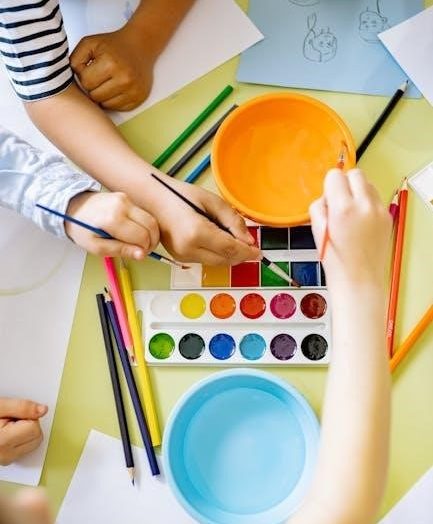Kindergarten readiness ensures children are prepared for formal education, focusing on social, emotional, physical, and cognitive skills. Checklists like the Kindergarten Readiness Checklist and assessments such as the Kindergarten Readiness Assessment (KRA) help identify essential skills for a smooth transition, guiding parents and educators in fostering readiness without determining enrollment eligibility.
Why Kindergarten Readiness Matters
Kindergarten readiness is crucial as it sets the foundation for a child’s academic and personal growth. Being prepared helps children adapt to the classroom environment, build confidence, and develop essential skills for lifelong learning. Research shows that readiness improves social interactions, emotional stability, and cognitive abilities, leading to better academic performance. A prepared child is more likely to succeed in school and beyond. Parents and educators can use tools like the Kindergarten Readiness Checklist to identify areas for growth, ensuring children enter kindergarten with the necessary skills. Early preparation reduces anxiety for both children and parents, fostering a positive transition to formal education.
Understanding the Checklist for 2023
The 2023 Kindergarten Readiness Checklist is a comprehensive guide designed to help parents and educators assess a child’s preparedness for school. It focuses on key areas such as social-emotional skills, physical development, cognitive abilities, and language communication. The checklist includes specific tasks like counting up to 51, recognizing letters, and understanding basic shapes and colors. It also evaluates independence in daily tasks, cooperation with peers, and emotional regulation. This tool is not for enrollment decisions but to identify skills needing improvement. By using this checklist, parents can engage in targeted activities to strengthen their child’s readiness, ensuring a smooth transition to kindergarten and setting them up for future success.
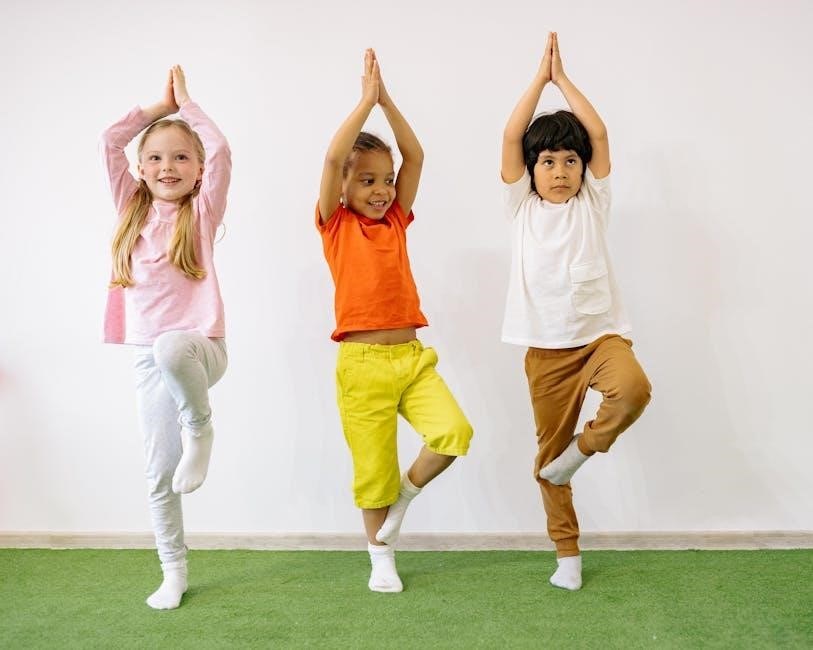
Social-Emotional Skills
Social-emotional skills are crucial for kindergarten success. They include self-awareness, cooperation, and emotional regulation, helping children interact confidently with peers and adults, share, and manage their feelings effectively.
Self-Awareness and Confidence
Self-awareness and confidence are foundational social-emotional skills. Children should recognize their personal characteristics, such as name, age, and family members, and express their thoughts and feelings clearly. They should demonstrate independence in simple tasks, like completing puzzles or using the toilet, showcasing their ability to trust their abilities. Confidence also involves willingness to take risks, like speaking in front of others or trying new activities, fostering resilience and adaptability. These skills help children navigate classroom environments and build positive relationships with peers and teachers, as highlighted in the Kindergarten Readiness Checklist and assessments like the KRA.
Cooperation and Friendship Skills
Cooperation and friendship skills are vital for Kindergarten success. Children should demonstrate the ability to share, take turns, and show kindness toward others. They should engage in group activities willingly and listen to others’ ideas, fostering teamwork and mutual respect. Verbal and non-verbal communication skills, such as using polite language and understanding social cues, are essential for building positive relationships. Additionally, children should be able to express empathy and resolve conflicts respectfully, showing an understanding of cooperation and friendship dynamics. These skills, as outlined in the Kindergarten Readiness Checklist, help children navigate social interactions and develop meaningful connections with peers and teachers, laying a strong foundation for classroom collaboration and social growth.
Emotional Regulation and Empathy
Emotional regulation and empathy are crucial skills for Kindergarten readiness. Children should begin to recognize, express, and manage their emotions appropriately. They should demonstrate an understanding of how others feel and show kindness toward peers. Empathy involves comforting someone who is upset and understanding different perspectives. Emotional regulation includes calming down after feeling upset and controlling impulses in challenging situations. These skills, as highlighted in the Kindergarten Readiness Checklist, foster positive social interactions and resilience. By developing emotional awareness and compassion, children can navigate classroom environments more effectively, build strong relationships, and respond thoughtfully to others’ emotions, creating a supportive and inclusive learning atmosphere.
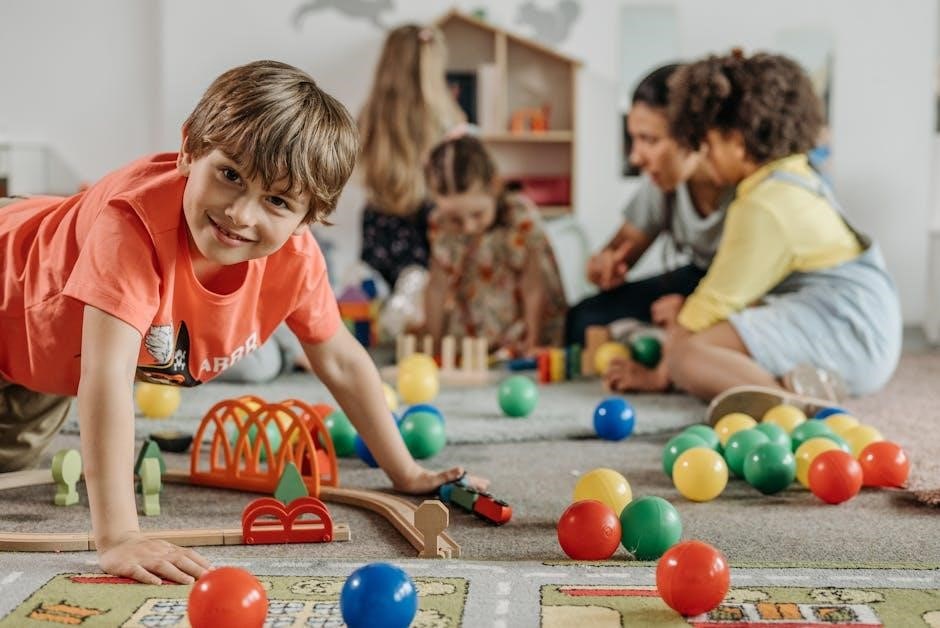
Physical Development
Physical development includes gross motor skills like running, jumping, and balance, as well as fine motor skills for tasks like using utensils or drawing. Health awareness is also key, with children demonstrating independence in self-care activities like using the toilet and washing hands, as outlined in the Kindergarten Readiness Checklist for 2023.
Gross Motor Skills
Gross motor skills are essential for kindergarten readiness, involving large muscle groups. Children should be able to run, jump, hop, and climb with coordination and balance. According to the Kindergarten Readiness Checklist, they should also demonstrate the ability to kick a ball forward, throw a ball overhead, and move with agility. These skills are vital for physical play and classroom activities. Parents can encourage development through outdoor play and active games. Refinement of these skills supports overall physical confidence and readiness for school environments, as emphasized in the 2023 guidelines and resources like the NACS Kindergarten Readiness Checklist.
Fine Motor Skills
Fine motor skills involve precise movements of hands and fingers, crucial for tasks like writing, drawing, and using utensils. By 2023, children should demonstrate the ability to use scissors to cut straight lines, draw simple shapes, and color within boundaries. They should also show proficiency in tasks like buttoning shirts and holding pencils correctly. According to the Kindergarten Readiness Checklist, these skills are foundational for academic activities. Parents can foster development through playdough, puzzles, and tracing games. Mastery of these skills enhances dexterity and prepares children for classroom tasks, aligning with guidelines from resources like the Free Printable Kindergarten Readiness Checklist PDF and expert recommendations for school readiness.
Health and Safety Awareness
Health and safety awareness is crucial for children to navigate their environment safely and maintain well-being. By 2023, children should understand basic hygiene practices, such as washing hands regularly, covering coughs and sneezes, and using tissues. They should also demonstrate an understanding of safety rules, like holding hands when walking in public and avoiding dangerous objects. According to the Kindergarten Readiness Checklist, children should know basic first aid concepts, such as informing an adult when hurt and understanding simple emergency procedures. Parents and educators can reinforce these skills through practice and discussion, ensuring children are prepared to handle common situations confidently. This foundation supports overall readiness and independence in a school setting, as highlighted in the Free Printable Kindergarten Readiness Checklist PDF.
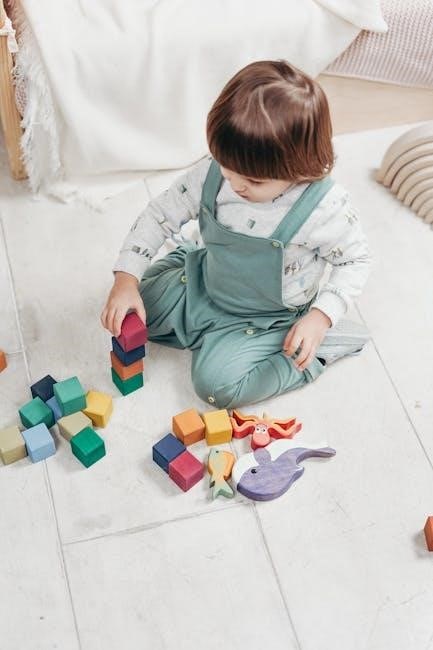
Cognitive Development
Cognitive development involves problem-solving, memory, and understanding numbers. It lays the groundwork for academic success, fostering curiosity and the ability to adapt to new learning environments effectively.
Problem-Solving and Critical Thinking
Problem-solving and critical thinking are essential skills for kindergarten readiness. These abilities help children navigate challenges and make informed decisions. Activities like puzzles, sorting games, and simple tasks encourage logical reasoning;
Children should demonstrate an understanding of cause-and-effect relationships and explore solutions to everyday problems. For example, they might figure out how to share toys or resolve conflicts with peers.
The Kindergarten Readiness Checklist includes tasks like counting to 51 and reading numbers up to 32, which also enhance problem-solving skills. These exercises prepare children to approach academic challenges with confidence and creativity.
By fostering critical thinking, parents and educators equip children with tools to succeed in a dynamic learning environment.
Memory and Imitation Skills
Memory and imitation skills are crucial for kindergarten readiness, as they lay the foundation for learning and social interactions. Children should be able to recall simple sequences, such as counting to 10 or repeating a series of actions demonstrated by an adult.
Imitation skills involve copying movements, gestures, or tasks, which helps with understanding instructions and developing fine motor abilities. For example, a child might imitate drawing shapes or tracing letters.
These skills are often assessed through tasks like the letter naming inventory, where children identify letters and demonstrate their recognition. Strengthening memory and imitation abilities prepares children to follow routines, remember classroom rules, and engage in group activities effectively.
Understanding Numbers and Counting
Understanding numbers and counting is a fundamental skill for kindergarten readiness. Children should be able to count aloud to at least 20, recognize numbers 1–10, and demonstrate basic number concepts like “one-to-one correspondence.”
They should also identify numbers in their environment, such as on signs or toys, and understand sequencing (e.g., first, next, last). Simple math concepts, like adding or subtracting one object, are also important.
Practicing with activities like counting games, number matching, and sorting objects helps reinforce these skills. These foundational math skills prepare children for more complex problem-solving in kindergarten and beyond.

Language and Communication
Language and communication skills are vital for kindergarten success. Children should identify and name uppercase and lowercase letters, recognize sounds, and engage in simple conversations.
These skills build a strong foundation for reading and social interactions, helping children express thoughts and understand others effectively in a classroom setting.
Vocabulary and Sentence Structure
By kindergarten, children should demonstrate a basic understanding of vocabulary and sentence structure. They should recognize and identify common sight words, understand simple sentence formats, and begin to use language to express thoughts clearly.
Your child should be able to identify the beginning sounds of words, recognize rhyming words, and engage in short conversations using appropriate grammar.
Practicing these skills through reading, singing, and interactive games helps build a strong foundation for reading and communication in the classroom environment.
Listening and Following Directions
Listening and following directions are critical skills for kindergarten readiness. Your child should be able to understand and respond to simple verbal instructions, such as “Please put the toy away” or “Find your shoes.”
They should also demonstrate the ability to follow multi-step directions, like “First, pick up the blocks, then put them in the basket.”
In a classroom setting, your child will need to listen attentively during lessons and follow instructions without constant reminders.
Practicing these skills through activities like listening games, scavenger hunts, or completing simple tasks can help build their ability to focus and comply with directions effectively.
Expressing Thoughts and Ideas
Expressing thoughts and ideas is a fundamental skill for kindergarten readiness. Your child should be able to communicate their thoughts clearly using complete sentences and appropriate vocabulary.
They should feel comfortable describing their ideas, needs, and feelings to both peers and adults in a classroom setting.
This skill fosters effective communication and collaboration, essential for learning and social interactions.
Encourage your child to engage in conversations, share stories, and explain their reasoning through activities like drawing, storytelling, or role-playing.
By practicing verbal and non-verbal communication, your child will build confidence in expressing themselves, laying a strong foundation for academic and social success in kindergarten.
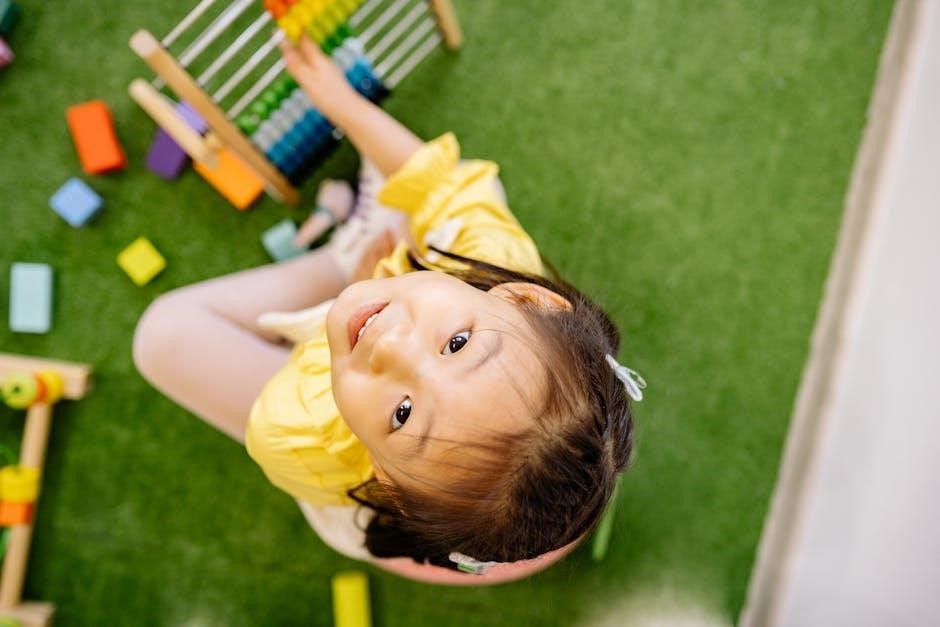
Academic Foundations
Academic foundations are the cornerstone of kindergarten readiness, focusing on essential skills like recognizing letters, understanding numbers, and basic writing. Checklists like the Kindergarten Readiness Checklist and assessments such as the Kindergarten Readiness Assessment (KRA) evaluate these skills, ensuring children are prepared to succeed in a structured educational environment.
Alphabet and Letter Recognition
Alphabet and letter recognition are foundational skills for kindergarten readiness. According to the Kindergarten Readiness Checklist, children should identify uppercase and lowercase letters, understand their sounds, and recognize their names. The Arkansas Child Development and Early Learning Standards emphasize letter naming inventory and sound recognition as critical skills. These abilities help children decode words and build reading skills. Parents can support this by practicing the alphabet, using flashcards, and engaging in activities that connect letters to sounds. The Irvine Unified School District highlights these skills in their readiness checklist, ensuring children are prepared for structured learning environments. Early mastery of letter recognition sets the stage for future academic success.
Shapes and Colors
Identifying shapes and colors is a key component of kindergarten readiness. The Kindergarten Readiness Checklist suggests children should recognize basic shapes like circles, squares, and triangles, and differentiate between primary and secondary colors. These skills enhance visual recognition and cognitive development. Activities such as puzzles, coloring, and matching games can reinforce shape and color identification. The checklist emphasizes that understanding shapes and colors aids in problem-solving and creativity, which are essential for academic success. Parents can use resources like the Arkansas Child Development and Early Learning Standards to practice these skills effectively. Recognizing shapes and colors also supports early math concepts, preparing children for more complex learning in the future. This foundational knowledge is crucial for a smooth transition into kindergarten.
Basic Writing Skills
Basic writing skills are fundamental for kindergarten readiness. According to the Kindergarten Readiness Checklist, children should demonstrate the ability to trace lines, shapes, and letters. They should also attempt to write their name legibly, recognizing the connection between sounds and written symbols. These skills build hand-eye coordination and fine motor control, essential for future academic tasks. Understanding that writing conveys messages is a critical concept for early literacy development. Parents can encourage practice through activities like tracing, drawing, and writing simple words. The checklist emphasizes that these foundational skills prepare children for more complex writing tasks in kindergarten, fostering their creativity and communication abilities. Regular practice helps strengthen these skills, ensuring a confident start to their educational journey.
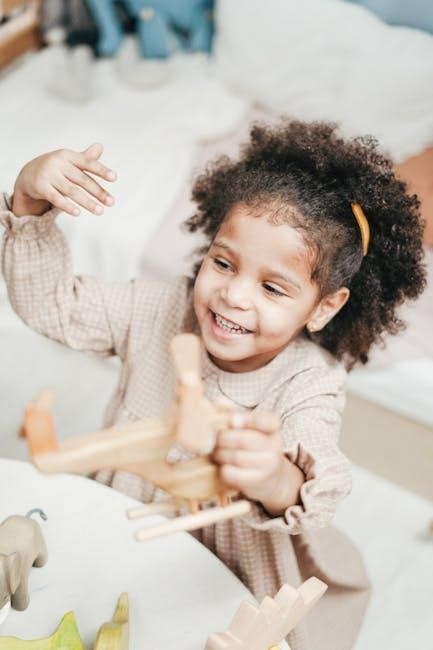
School Readiness Habits
School readiness habits include independence in completing tasks, respect for routines, and curiosity about learning. These habits, outlined in the Kindergarten Readiness Checklist, foster a smooth transition to formal education, helping children adapt to classroom environments and expectations.
Independence in Daily Tasks
Independence in daily tasks is crucial for kindergarten readiness. Children should demonstrate the ability to perform routine activities without constant supervision, such as using the bathroom, washing hands, and dressing themselves. According to the Kindergarten Readiness Checklist, parents should encourage children to complete tasks like putting away toys, using utensils during meals, and managing personal belongings. These skills not only build self-confidence but also ease the transition into a structured school environment. By mastering these tasks, children develop a sense of responsibility and self-reliance, which are foundational for academic success and social interactions in kindergarten.
Respect for Rules and Routines
Respecting rules and routines is a key component of kindergarten readiness. According to the Kindergarten Readiness Checklist, children should understand and follow simple classroom rules, such as raising hands to speak, taking turns, and listening to instructions. They should also demonstrate an ability to adapt to daily routines, like transitioning between activities or using materials appropriately. Teaching children to respect boundaries and cooperate with others helps them thrive in a structured environment. Consistent practice at home, such as establishing clear expectations and consequences, can reinforce these skills, ensuring a smoother transition into the classroom setting where rules and routines are essential for learning and social harmony.
Curiosity and Love for Learning
Cultivating curiosity and a love for learning is essential for kindergarten readiness. According to the Kindergarten Readiness Checklist, children should demonstrate an eagerness to explore, ask questions, and engage in new experiences. This includes showing interest in books, puzzles, and problem-solving activities. Encouraging curiosity helps children develop a positive attitude toward learning and builds confidence in their ability to discover and understand the world. Parents and educators can foster this by providing opportunities for exploration, praising effort, and modeling a love for learning themselves. A child who enters kindergarten with curiosity and enthusiasm is better prepared to embrace challenges and thrive in an academic environment, as highlighted by the Kindergarten Readiness Assessment (KRA).
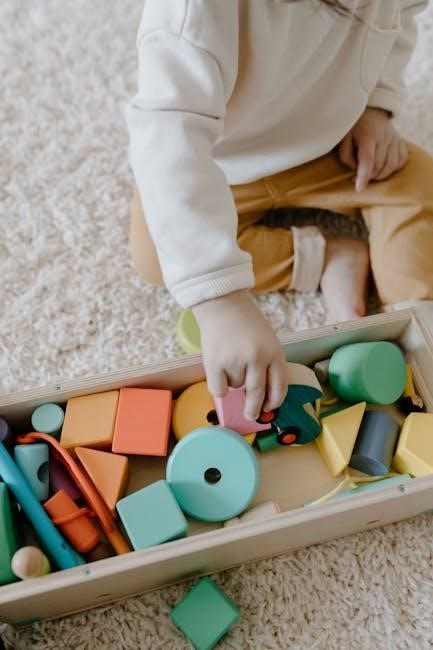
Additional Tips for Parents
Parents can support kindergarten readiness by using checklists like the Kindergarten Readiness Checklist to identify and reinforce essential skills. Engaging in activities that promote curiosity and independence helps build confidence and readiness for school.
How to Use the Checklist Effectively
Using the Kindergarten Readiness Checklist effectively involves identifying your child’s strengths and areas for growth. Start by reviewing the checklist with your child, focusing on one skill at a time. Celebrate their achievements and gently guide them in improving weaker areas. Consistency is key; incorporate practice into daily routines, such as counting objects during meals or practicing letter recognition through games. Track progress over time to see development and adjust activities accordingly. Remember, the checklist is a tool for preparation, not for determining enrollment eligibility. By fostering a supportive and engaging environment, you can help your child build confidence and readiness for kindergarten. Regularly consulting with teachers or educators can also provide personalized strategies for improvement.
Activities to Reinforce Skills
Engage your child in activities that promote learning and fun, such as puzzles for problem-solving, coloring for fine motor skills, and reading aloud to enhance language development. Use games like matching shapes or counting objects to build cognitive abilities. Encourage role-playing to foster social skills and emotional intelligence. Incorporate daily routines, like sorting laundry or setting the table, to teach organization and responsibility. Create a “word wall” at home to practice alphabet recognition and vocabulary. Utilize free printable worksheets, such as the All About Me Worksheet, to reinforce writing and self-awareness. Make learning interactive and tailored to your child’s interests to keep them motivated and excited about preparing for kindergarten.
Communicating with Teachers
Effective communication with teachers is crucial for supporting your child’s transition to kindergarten. Share the Kindergarten Readiness Checklist with educators to align home and school efforts, ensuring consistency in skill development. Discuss your child’s strengths and areas needing improvement, using the checklist as a guide. Regularly ask for updates on your child’s progress and how you can reinforce learning at home. Open dialogue helps create a collaborative environment, fostering a smooth adjustment for your child. By maintaining clear and ongoing communication, you and the teacher can work together to build a strong foundation for your child’s educational journey, ensuring they feel supported and confident in their new classroom setting.
Preparation is key for a successful kindergarten start. Focus on social-emotional, physical, cognitive, and language skills. Use the 2023 checklist to guide development and collaborate with teachers for a smooth transition.
Summarizing Key Readiness Skills
Key readiness skills for kindergarten include physical abilities like running and using utensils, social-emotional traits such as sharing and emotional regulation, and cognitive skills like problem-solving. Language skills, including understanding directions and expressing thoughts, are also crucial. These skills ensure children can adapt to a structured environment, interact with peers, and engage in learning activities confidently. Checklists like the Kindergarten Readiness Checklist highlight these areas, providing a clear roadmap for parents and educators to assess and support development. By focusing on these foundational skills, children are better prepared for academic and social success in kindergarten and beyond.
Final Thoughts for a Successful Transition
A smooth transition to kindergarten begins with understanding the essential skills outlined in the 2023 Kindergarten Readiness Checklist. Parents should focus on fostering independence, emotional resilience, and curiosity in their child. Encouraging a love for learning through play and daily routines can significantly ease the adjustment. Collaboration with teachers and using tools like the Kindergarten Readiness Assessment (KRA) can provide insights into areas needing support. By addressing these skills early, parents empower their children to thrive academically and socially. A positive start in kindergarten sets the foundation for future success, making the effort to prepare both child and family invaluable.
